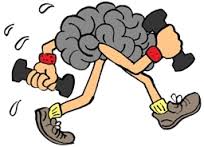 We already have begun to see polling regarding the candidates for the 2020 National Elections. Most pundits suggest that it is too early to call who will be the candidates of our major parties, let alone who may win. But researchers at the University of Michigan Institute for Healthcare Policy along with AARP recently conducted a national survey of more than 1,000 50 to 64 year olds about their health concerns regarding aging. Almost half said they fear developing some sort of cognitive issues, and many just plain said dementia is their fear. No surprise that it is closer to three quarters of those with a family history of dementia who fear dementia in their own futures. About one third of respondents with no family history still had concerns about their own brain health as they age.
We already have begun to see polling regarding the candidates for the 2020 National Elections. Most pundits suggest that it is too early to call who will be the candidates of our major parties, let alone who may win. But researchers at the University of Michigan Institute for Healthcare Policy along with AARP recently conducted a national survey of more than 1,000 50 to 64 year olds about their health concerns regarding aging. Almost half said they fear developing some sort of cognitive issues, and many just plain said dementia is their fear. No surprise that it is closer to three quarters of those with a family history of dementia who fear dementia in their own futures. About one third of respondents with no family history still had concerns about their own brain health as they age.
You may recall that in past posts on my book, How Do I Know you: A Caregiver’s Lifesaver for dealing with Dementia, the care managers we interviewed reported dementia as a tie for the number one issue for which they are engaged to help families. That was about two of every three engagements, and the same number were for helping families to assure home safety for an older loved one. So, the 50 to 64 year olds in the national survey are looking perhaps to their present caregiving duties as a crystal ball on their own future.
Across all groups in the survey about three in four say that they are taking vitamins or supplements or engaging in “brain games” to keep their mental health sharper. But that is only part of the game plan to stay mentally acute today in the hope of a better brain tomorrow. Researchers recently published a Top Ten list of what we all can do to have a healthier brain tomorrow in the journal Psychology Today. They suggest:
- Stop Smoking – there are a ton of health benefits to this step.
- Social Engagement – having a spouse of close friend actually gives us a chance to hone our transactive memory skills…kind of a team memory exercise.
- Keep you Sunny Side Up – Yes, having a positive outlook improves brain function.
- Sleep Well – not just long – although 7 to 9 hours are recommended – but the kind of quality sleep where your dreams are just part of your brain’s daily work.
- Eat Well – there are entire books written on healthy diet, but protein and vegetables are at the core – processed foods not so much.
- Mindfulness – Okay, please go back to last week’s post to get a handle on the importance of meditation and relaxation therapy.
- Physical Workouts – Increasing your heart rate and muscle coordination force your brain to sort out the latter while receiving a boost in oxygen and glucose.
- Brain Workouts – It is not just reading, but reading to someone else or sharing are great ways to engage and exercise your gray matter.
- Back to School – Never mind what reservations you have about some school days issue, learning something new is good – a craft, a language, etc.
- Brain Coaching – There actually are specific gaming activities that sharpen the senses and the brain’s ability to process new challenges.
As with any workout regimen, you don’t have to do it all at once or right now…start with one thing and build…toward a better cognitive future.
Charlotte Bishop is an Aging Life Care Advisor, Geriatric Care Manager and founder of Creative Care Management, certified professionals who are geriatric advocates, resources, counselors and friends to older adults and their families in metropolitan Chicago.






